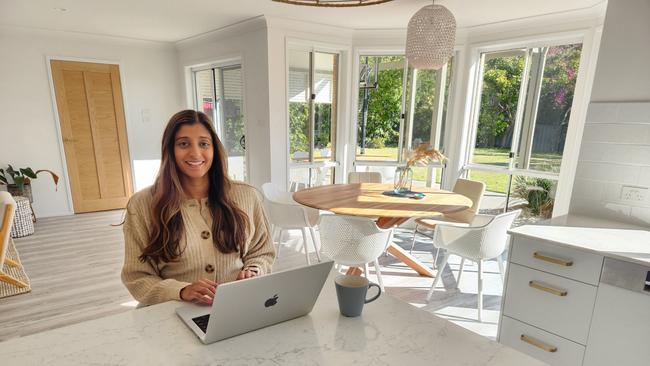Australia’s remote workers earning higher incomes to ease cost-of-living pain
Australia’s “anywhere workers” are reporting higher incomes, with some reporting that staying away from the office has allowed them to buy a home.

Careers
Don't miss out on the headlines from Careers. Followed categories will be added to My News.
Staying away from the office could ease cost-of-living concerns, with half of remote workers enjoying a higher income since shifting to more flexible employment.
As calls intensify for workers to return to the office, experts say there are compelling financial reasons for Australians to continue remote work arrangements, encouraging those who are forced to be on-site to “vote with their feet”.
“Remote workers can go and build a really substantial career and get a really great income,” says Oliver Woolrych, community organiser at freelance marketplace Fiverr.
“You can be anywhere in the world … making a pretty penny.”
The benefits
Fiverr’s global survey of “anywhere workers” – defined as remote workers who travel from at least two locations throughout the year – reveals 48 per cent have seen their earnings increase since shifting to the flexible work arrangement.
Just six per cent say their earnings have declined.
The findings coincide with research by tech firm Atlassian, which shows 14 per cent of Australians who are not mandated to work in an office have been able to purchase a home.
While the Fiverr survey did not ask workers to explain how their income had increased, Woolrych suggests it could be through increased productivity as workers use the time they would otherwise spend commuting to the office to complete more projects.
However, he believes the biggest financial benefit to remote work comes from money saved, with those not required to come into the office able to move to locations where costs of living are far less onerous.
“For so long, we have considered high quality work and high quality workers to be at a desk in a building in a CBD from 9-5. That was the only way to make a good wage and grow a career,” Woolrych says.
“But I’m sure there are plenty of talented Australians living up in Bali for the winter, avoiding the cost of living down here in Australia and … building a really substantial salary.”
He says those not yet working remotely, but wanting to do so, should appeal to their employer’s hip pocket, arguing that more remote workers requires less office space and, consequently, smaller lease payments for buildings.

Cheaper living costs
Remote work arrangements gave Asha Bhatt, a group program manager at Atlassian, and her partner the opportunity to buy their first home.
They had previously rented a small apartment in Manly, in Sydney’s sought-after Northern Beaches area.
When Covid lockdowns forced the pair out of their offices, they moved to Caves Beach in the more affordable Newcastle region, and purchased a five-bedroom home overlooking the sea.
“I don’t think we would have been able to move this far away (from Sydney) if we were doing five days in the office,” Bhatt says.
“And we could never have afforded (a comparable home) in Sydney – this house was about the same price as we were paying (to rent) in Manly.”
Bhatt says her day-to-day expenses have reduced considerably since moving from Sydney. Nights out are less frequent, saving up to $200 an outing, and working from home has reduced the spontaneous purchases she used to make on “random stuff” during her lunch hour in the city.
“It (living in Caves Beach) is not a like-for-like comparison (to Manly) but it is easier to budget for and … there’s definitely more opportunities to save money,” she says.
Permanent change
NSW Premier Chris Minns recently joined those appealing to Australians to return to the office, mirroring employer calls for a reduction in work-from-home days.
But Atlassian Team Anywhere leader Annie Dean says remote work is here to stay and encourages those in roles that do not allow working from home to “vote with their feet” and find a new job that does.
Dean says the benefits of remote work extend beyond purely financial and argues suggestions that remote workers are less valuable than their in-office colleagues, or get overlooked for promotion, are unsubstantiated.
But she says companies must improve on the remote work policies that were rushed out in the early days of the pandemic and adopt a more considered approach. She notes half of Aussies working away from the office have still not been provided with the remote collaboration tools required to perform their role.
“When people talk about distributed (flexible) work, a lot of the conversation is about what is lost from our lives … as people try to justify get-back-to-the-office practises,” Dean says.
“But people do have a better quality of life as a result of distributed (flexible) work.
“Flexible and distributed work are permanent changes to the way we approach work. What’s important now is how do we really excel at this.”
Outside the office
When Australians are not mandated to work in an office, they are able to
• Buy a house (14 per cent)
• Start a family (11 per cent)
• Spend more time with family (59 per cent)
• Spend more time on their physical or mental health (52 per cent)
• Pursue a new hobby or interest (39 per cent)
• Care for a sick, disabled or elderly loved one (20 per cent)
• Dedicate time to their community or a charity (11 per cent)
Source: Atlassian
Originally published as Australia’s remote workers earning higher incomes to ease cost-of-living pain


